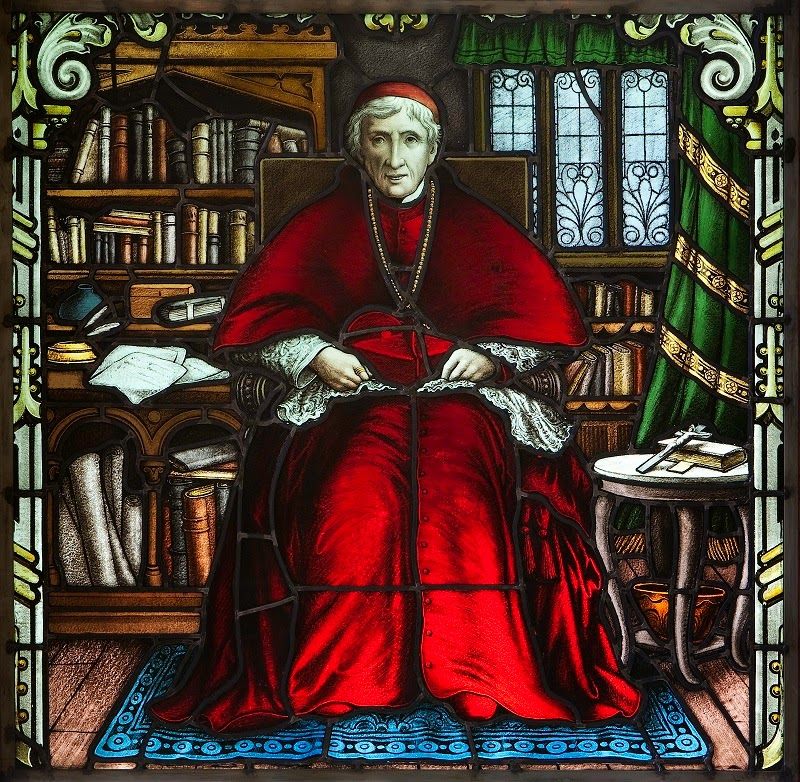 August 10th is the anniversary of St. John Henry Newman’s death in 1890. Fr. Ed Ondrako presents information from the August 4, 2022 Newman Conference. The focus was Newman’s “interiority” which is the integrating force in his 89 years.
August 10th is the anniversary of St. John Henry Newman’s death in 1890. Fr. Ed Ondrako presents information from the August 4, 2022 Newman Conference. The focus was Newman’s “interiority” which is the integrating force in his 89 years.
_______________________________________
Newman, Arguer and Sniper
Outer circle for reflection on Newman’s interiority as, an inner circle
Part One
Text and Context; Prologue; Procedural Remark
Abstract. It is difficult to understand the outer circle without an integrating knowledge of Newman’s “interiority.” Newman is an “arguer” because religion is worth arguing about. His target was John Locke who washed and rinsed Christianity, its practices, devotions and prayers, yet did not countenance atheists. Christology was reduced to Arianism at best. Mariology was thrown overboard. Worship made no sense.
- Text and Context.
In 1850, Newman delivered “Twelve Lectures on Certain Difficulties Felt by Anglicans in Submitting to the Catholic Church.” In 1833, J.Keble, E. B. Pusey, H. Froude, and W. Ward were prayerful friends in a common quest for the true and ancient Church.
- Prologue.
Newman lived in modernity which is very different from living in pre-modernity. In mid life he came to realize that the Roman Church, with all of its saints and sinners, traumas and glorious moments, was the only Church that could validly claim to trace itself to the Church of the Apostles.
- Procedural Remark.
- At least two senses define the “gift” of modernity. Giften is cure and poison.
- Your questions should include a look back with Newman’s critical eye.
- Your questions should include a close look at what he says in the Apologia about late 1844 and 1845. He was writing himself into the Roman Church. He learned why modern Roman doctrines were legitimate developments.
- What method would be better than Newman’s seven tests, notes or markers about the character of doctrinal development?
- Preservation of the type
- Continuity of principles
- The power of assimilation
- Logical sequence
- Early anticipations
- Preservative additions
- Chronic continuance
Part Two
Loci of Questioning; Analysis; Prophetic Voice; Recapitulation;
Three loci of questioning about post-Christian culture
- External forces
- Temporization by Church authorities
- Inviting in the secular without competence to regulate Christianly
Analysis
- First, Newman had the instinct to identify post-Christian culture.
- Second, Newman had the competence to invite the secular.
- Third, Newman knew how to extricate himself from liberalism in religion.
- Fourth, Newman used memory to remember forward.
- Fifth, for Newman, secularity is not the same as secularism.
Newman’s Prophetic Voice is one of lamentation and jubilation. Newman exposes idolatry as idolatry. The Catholic Church missed opportunities to prepare Catholic thinkers who could engage Kant and Hegel. Newman’s Letter to Norfolk (1874-1875) offered a comprehensive treatise on authority and conscience. Newman’s voice aligns with Rahner, Balthasar, deLubac, Wojytla, and Ratzinger while not necessarily with all of their ideas.
Recapitulation
External forces are not the only cause of post-Christian culture. A seismic shift today is the erosion of belief in the doctrines, practices, and form of life in the Catholic Church. Newman gave us an explicit vocabulary leading towards simple assent that brought certitude and certainty about the true Church.
Conclusion
Newman’s “Twelve Lectures on Certain Difficulties Felt by Anglicans in Submitting to the Catholic Church,” interpret the intentions of the Religious Party of 1833. He was engaging a “post-Christian culture.” He lived with a peaceful trust in slow-paced truth knowing a bunker mentality could never engage effectively. The contents warrant Vatican II to be referred to as “Newman’s Council.” His canonization sealed him as theologian. His works reveal an arguer, a Christian sniper, and genius at guerilla warfare with his “inner life” as unifying.
eondrako@alumni.nd.edu
